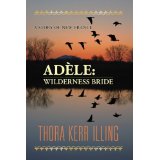Adele: Wilderness Bride – a novel of New France
In the 1660s, when illegitimate orphan Adele Dupuy leaves for New France aboard a ship of similarly-disadvantaged young women, she is known as une fille a marier, meaning a marriageable girl intended to increase the colony’s population. Two years later, when she seeks refuge in Quebec City after having escaped her brutish husband, she discovers the term for those of her kind, who now arrive regularly from overseas, has been changed to filles du roi (daughters of the king). Even then, politicians knew the value of a catchy slogan for a campaign.
Author Illing has done a profound job of research into this rarely-written historical episode, and Adele: Wilderness Bride can serve as a valuable resource for anyone interested in this period. But as fiction? Although the characters are realistic enough, they are not presented in scenes. I sorely missed having a sense of place for each conversation, nor am I a fan of removing commas from long compound sentences and of dispensing with indentations in dialogue. For the most part, though, Adele was a compelling read but at arm’s length only.










